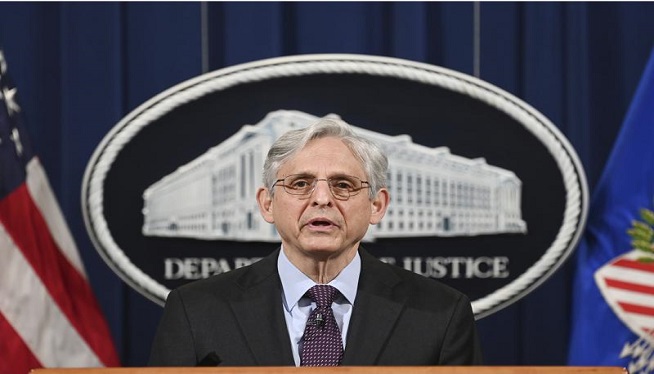WASHINGTON (AP) — The Justice Department is opening a sweeping probe into policing in Louisville, Kentucky over the March 2020 death of Breonna Taylor, who was shot to death by police during a raid at her home, Attorney General Merrick Garland announced Monday.
It’s the second such sweeping probe into a law enforcement agency by the Biden administration in a week.
The 26-year-old Taylor, an emergency medical technician who had been studying to become a nurse, was roused from sleep by police who came through the door using a battering ram. Her boyfriend, Kenneth Walker, fired once. A no-knock warrant was approved as part of a narcotics investigation. No drugs were found at her home.
The new investigation is known as a “pattern or practice” — examining whether there is a pattern or practice of unconstitutional or unlawful policing — and will be a more sweeping review of the entire police department.
Garland last week announced a probe into the tactics of the police in Minneapolis following the death of George Floyd. The attorney general has said there is not yet equal justice under the law and promised to bring a critical eye to racism and legal issues when he took the job. Few such investigations were opened during the Trump administration.
Former Minneapolis police officer Derek Chauvin was convicted last week of murder in Floyd’s death, but no one has been charged in Taylor’s, though her case, too fueled protests against police brutality and systemic racism.
Her death prompted a national debate about the use of so-called “no knock” search warrants, which allow officers to enter a home without waiting and announcing their presence. The warrants are generally used in drug cases and other sensitive investigations where police believe a suspect might be likely to destroy evidence. But there’s been growing criticism in recent years that the warrants are overused and abused.
Kentucky’s lawmakers passed a partial ban on no-knock warrants last month. The measure would only allow no-knock warrants to be issued if there was “clear and convincing evidence” that the “crime alleged is a crime that would qualify a person, if convicted, as a violent offender.” Warrants also would have to be executed between 6 a.m. and 10 p.m.
Copyright 2021 The Associated Press. All Rights Reserved. This material may not be published, broadcast, rewritten, or redistributed. PHOTO AP





















